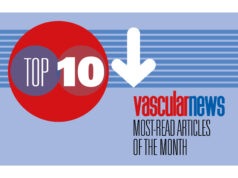
Coffee in Zauner, that was the possibility if you attended the Austrian Vascular Society in Bad Ischl in October 2002. The congress took place under the presidency of Wolfgang Simma and he and his wife, Renate, were delightful hosts.
The Presidential Dinner took place on Wednesday 2nd October in Schloss Fuschl. This was the site of the delightful “Sissy films. Sissy was of course the wife of Kaiser Franz Josef. She came from Bavaria and is immortalised in the films played by Romy Schneider. Bad Ischl was the site of the Kaiser’s hunting lodge. He took coffee in his favourite coffee house, Zauner, and it is said to be the same today as it was in those days. The Austrian Vascular Society naturally met for dinner one evening in the Kaiser’s hunting lodge in the hills (alive with the Sound of Music).
Emphasis on new techniques and training
In his presidential speech, Simma emphasised the continuing need for vascular surgeons and the importance of training. “No other area emphasises the meaning and the dominating importance of vascular surgery, than vascular injuries, which is the main topic of our conference. Many lives and many extremities exist today due to the vascular surgeon. The boom of interventional techniques is connected with a number of complications that are not to be under estimated. Puncture occurrences, injuries of the pelvis, etc demand, at times, very technical rescue measures. In connection to this, it is almost paradoxical that instruments that were created to avoid puncture occurrences can create extreme complications such as aneurysm. The growing number of diabetic feet, resulting in a high rate of amputations, is a challenge to the vascular surgeon not only in vascular surgical technical terms but also in terms of patience and determination.
“Based on a study published last year, we can assume that with an increasing frequency of peripheral reconstructions you can reduce major amputations by 75%. Due to the increased life expectancy and the wealth of society, the number of our patients is on the increase. The intensive arterial sclerosis research has provided us with most interesting and fascinating results in regards to pathophysiology and potent pharmaceuticals. But up to the present there is no effective medication that can treat arterial sclerosis or prevent it. We are still a long away from the vision once predicted by Urs Brunner that vascular surgeons, angiologists and interventionalists will become unemployed due to miracle medications.
“There will be a need for well trained vascular surgeons for a long time yet. One of our most important tasks is the comprehensive training of the next generation, which worldwide most societies endeavour to do. Some see the word ‘globalisation’in a negative light, for us it means the best possible form of training. To meet these targets and provide optimal care for our patients, non-university hospitals must create vascular departments because vascular surgery demands very intensive attention. It is a special area, which you cannot deal with on the side.
Some of us have had a long vascular surgery career and we have seen a lot of techniques come and go, and we often return to the tried and tested ones. Nevertheless, we live in an exciting age and it would be a mistake to shut ourselves off from future developments. Archbishop Johann, who brought in a number of insights and social reforms over 200 years ago, had the motto:
“be true to the old ways but no less receptive to the new and better.
Programme
The scientific programme had a theme of “trauma”and was adorned by excellent presentations by Dr Norman Rich of Washington, Dr Frank Veith of New York and also Dr Malcolm Perry of Texas. These experts have considerable knowledge of vascular trauma. Dr Rich has had a distinguished career at the centre of things in Washington and has been a major advisor to the United States Government in military, and particularly naval matters. In his presentation Dr Rich described that his parents were born in that part of the then Austrian empire, Croatia. Dr Veith made no such claims but it was Dr Malcolm Perry, the distinguished trauma surgeon who received Dr Martin Luther King and President John F. Kennedy under tragic circumstances. It is legendary that one of Dr Perry’s teachers wired him to complain that survival statistics were below par! The three American surgeons achieved honorary membership of the Osterreichische Gesellschaft fur Gefasschirurgie. It was well attended and well supported by industry and visitors left with the certain knowledge that Austrian vascular surgery is well served by a splendid society. Dr Wolfgang Simma and his team in Voeklabruck did a splendid job and are to be congratulated.













